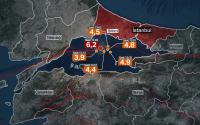Common Dreams / Published on Thursday, August 24, 2006 by the Toronto Star / Canada
It has been said that Israel has made the same mistake in Lebanon as it did in 1982: using overwhelming military force to solve a political problem. It failed then and it has failed now.
In fact, this war is a greater political and moral disaster, even though it was shorter (34 days vs. three months), caused a lower Lebanese death toll (1,600 vs. 18,000) and ended without Israel occupying large swaths of Lebanon. Here's why.
Whereas the Palestine Liberation Organization was dealt a near death blow and driven out of Lebanon, Hezbollah has emerged politically strengthened. Yasser Arafat and his entourage were foreigners who had overstayed their welcome, whereas Hassan Nasrallah and Hezbollah represent indigenous forces.
In 1982, Israel had several Lebanese allies but this time it has none to do its bidding.
Whereas Israel has demonstrated, yet again, that it can cause death and destruction at will, its aura of invincibility has been punctured. Hence the talk in Israel of "the next round" to restore that image. On the other side, Arab/Muslim militants feel emboldened.
So, unlike the post-1982 lull in hostilities, "both sides will now be looking for an opportunity to advance their cause," says professor James Reilly, a University of Toronto expert on the Middle East. "That makes a renewal of conflict more likely, not less likely."
There are several other, less obvious, reasons why this war has left a greater impact on world consciousness.
While the North American media sanitized the horrors of this war, media elsewhere, especially in the Arab/Muslim world, showed the full impact of the indiscriminate bombing. This is a repeat of the pattern we've seen in Afghanistan, Iraq and the Israeli Occupied Territories; one version of events shown in North America and quite another elsewhere. This inability to control the narrative enrages George W. Bush and other conservatives. They accuse the burgeoning, and increasingly free, Arab media of being biased and sensationalist — a ludicrous proposition coming from the fans of Fox-TV and CNN. The recent reality TV coming out of Lebanon, along with the videos and reports circulating on the Internet, created such a public backlash in Europe and the Middle East that governments were forced to pressure the U.S. into dropping its opposition to a ceasefire. Only Stephen Harper stayed firm in favour of letting Israel continue pummelling Lebanon, placing Canada in the odd position of welcoming a ceasefire he had so resolutely resisted. Human rights advocates played a much more forceful role this time. Besides UN Human Rights Commissioner Louise Arbour raising the spectre of war crimes, the UN Human Rights Council condemned "the grave Israeli violations of human rights and breaches of humanitarian law," and the "massive bombardments of civilian populations, especially the massacres in Qana, Marwaheen, Al Duweir, Al Bayadah, Al Qaa, Chiyah, Ghazieh and other towns, and the displacement of 1 million civilians." For those who accuse the UN agency of anti-Israeli bias, Human Rights Watch and Amnesty International also said Israel may have committed war crimes. Rights Watch condemned Israel's use of cluster bombs. The unexploded ones in people's homes and in fields now pose a danger to returning refugees, and may take a year or more to diffuse. Yesterday, Amnesty said the destruction of thousands of homes, roads, bridges and water and fuel storage plants "was an integral part of Israel's military strategy, rather than `collateral damage' resulting from the lawful targeting of military objectives." The Israeli-U.S. selectivity in insisting on implementing UN resolutions on Lebanon while ignoring earlier ones calling Israel to withdraw from the Occupied Territories is no longer lost on the world. Nor is the hypocrisy of calling on Hezbollah to disarm while turning a blind eye to scores of militias in Iraq and Afghanistan. These double standards draw derision, including from those who favour disarming Hezbollah. The Lebanon offensive coincided with the deadliest month in the Gaza Strip and Iraq, where the July death toll was reportedly 151 and 3,438 respectively. The headlines coming out of all three were the same: Muslims being massacred — by Iraqi insurgents or by Israel and the United States. That, combined with the rhetorical war over Iran's nuclear program, prompted American geo-strategist Zbigniew Brzezinski to say: "Today, it's becoming increasingly difficult to separate the Israeli-Palestinian problem, the Iraq problem and Iran from each other. Neither the U.S. nor Israel has the capacity to impose a unilateral solution on the Middle East." That is the growing consensus in the world, increasingly among Canadians as well, even if not yet in our political and media establishment.Haroon Siddiqui, the Star's editorial page editor emeritus, writes Thursday and Sunday.





